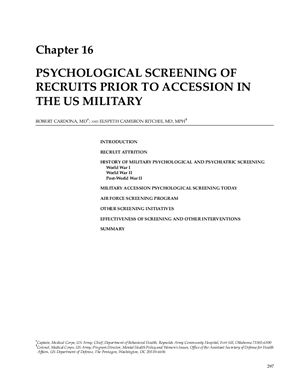Washington, D. C. Psychological Searching and Rewiew, Vol. 23.
2004. pp. 297-309.
There is not an inexpensive screening tool with adequate predictive validity and reliability to identify
individuals at high-risk of attrition before they enter military training and service. The best predictor of success in the military is still a high school diploma or 2 or more years of college. Shifting efforts and resources to Psychological Screening of Recruits Prior to Accession in the US Military
training interventions and retention issues may reduce first-term attrition. The concept of rehabilitation and adjunctive training is supported by the DoD and has occurred in a multitude of medical areas (eg, management and prevention of stress fractures). While maintaining
rigorous standards, can we train recruits up to a standard and assist in their adaptation to the stress of military training and service in a way that will improve long-term functioning, reduce attrition, and potentially increase retention? Even beyond mere adaptation and adjustment issues, with current psychological and psychiatric treatments available, is it possible to focus on preventative measures and even treat mild psychiatric conditions early in a service member’s career, rather than discharging that individual and losing the financial and personnel resources that have already been invested? These are important issues that still need further consideration and evaluation
There is not an inexpensive screening tool with adequate predictive validity and reliability to identify
individuals at high-risk of attrition before they enter military training and service. The best predictor of success in the military is still a high school diploma or 2 or more years of college. Shifting efforts and resources to Psychological Screening of Recruits Prior to Accession in the US Military
training interventions and retention issues may reduce first-term attrition. The concept of rehabilitation and adjunctive training is supported by the DoD and has occurred in a multitude of medical areas (eg, management and prevention of stress fractures). While maintaining
rigorous standards, can we train recruits up to a standard and assist in their adaptation to the stress of military training and service in a way that will improve long-term functioning, reduce attrition, and potentially increase retention? Even beyond mere adaptation and adjustment issues, with current psychological and psychiatric treatments available, is it possible to focus on preventative measures and even treat mild psychiatric conditions early in a service member’s career, rather than discharging that individual and losing the financial and personnel resources that have already been invested? These are important issues that still need further consideration and evaluation

